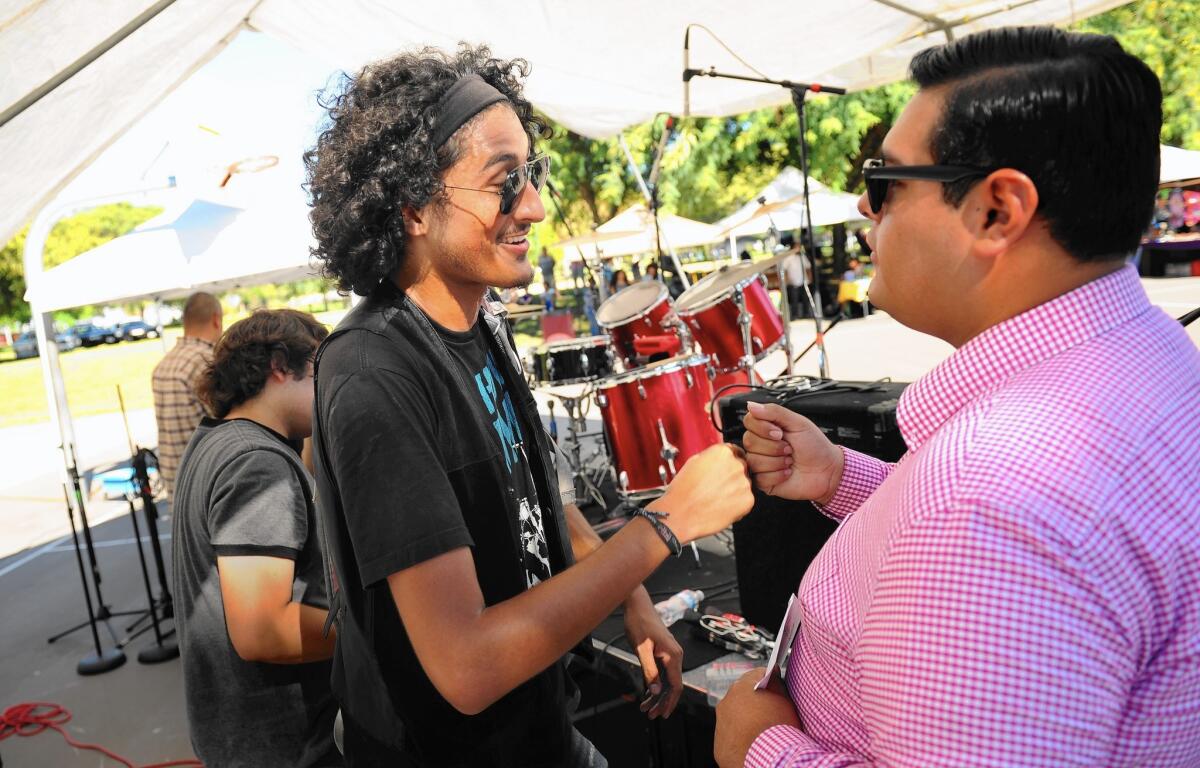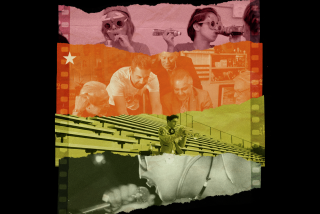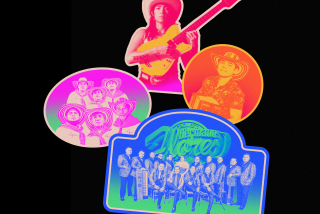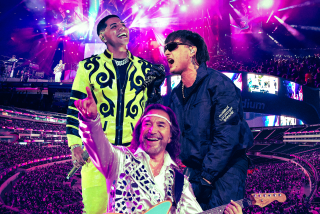By mounting Maywood Music Festival, young artists find a way to fit in

Maywood Music Festival organizer Jonathan Jimenez, left, thanks a member of the group Whiskey Dynamos after the concert.
There was no Mexican banda group belting out songs at Maywood Riverfront Park.
As much as the hot temperatures — and the heavy metal, hip-hop, urban cumbia and blues bands onstage — that might have partly explained the relatively sparse crowd along the Los Angeles River at the Maywood Music Festival.
Four years in, the concert has tended to draw small audiences. The August heat has played a role some years.
But there was also the inherent challenge behind the festival itself: Organizers say the festival is an effort to highlight the dual cultures of the children of immigrants who make up a large proportion of the region’s youth. Although the acts sometimes proudly jumped from English to Spanish, their core audience was young people who were more than likely born in the U.S.
In the past, events like festivals were typically sponsored and geared toward crowds that were not only older but favored traditional Mexican and other Latin American music, including rancheras.
This year a heavy metal band, Neblina, played “Breaking the Law” by Judas Priest, with its lead singer telling the crowd: “We’re going to play a song ... for all the Donald Trumps out there!”
“We needed something for us, the youth, the next generation,” said Jonathan Jimenez, 20, a USC English literature student studying creative writing and event organizer. “We’re trying to figure out where we fit in.”
In a place like Maywood, that’s not as easy as it may seem.
For many years, the most pitched political battles centered around the immigrant population. The city of 28,000 residents once declared itself a “sanctuary” for immigrants and waged a fight with its own police department over impounding the vehicles of unlicensed immigrants. More than half of Maywood’s population is foreign-born.
Social activism in Maywood has often been geared toward environmental issues and preserving the rights of immigrants, particularly those in the country without legal status.
But like a lot of cities roiled by controversy and scandal in recent years, Maywood’s City Hall has become younger. And with that shift, in Maywood and neighboring towns, have come efforts to try to tap into the region’s youth culture.
In Bell, musicians, painters and poets have crammed into a “garage salon,” the mastermind a twentysomething substitute teacher. A group of young people also created that city’s first art walk last year. The events were aimed to fill a void in art, museums and theater in the working-class cities tagged with reputations for political tumult and corruption along the 710 Freeway.
In Huntington Park, Victor Michel, 33, started a recording studio from home for music bands in Southeast L.A., including Mano Sucia and Wandering Gypsies, who have played in the Maywood Music Festival.
“I do it because I love it,” Michel said of his recording studio. “The Southeast has great talent and some of these artists are going to blow up.”
“We have friends opening up galleries. We have friends opening up delis and cafes, things we want to see in our community,” said David Martinez, 20, a high school friend of Jimenez’s who helped organize last year’s Maywood Music Festival. “This festival is coming from that same vein.”
Maywood Councilwoman Veronica Guardado, 54, said it was younger people who pushed her to use social media more in her job. “That shift began a few years ago, but it isn’t until now that we’re starting to really see it,” she said.
One of the first music festival organizers was Oscar Magaña, 34, a Maywood councilman who took office in 2011 in the wake of a political scandal in neighboring Bell that also enveloped Maywood.
Magaña said the inspiration for the event came from a concert in Lincoln Heights, a neighborhood in L.A.’s Eastside, where the mostly Mexican American community goes back many generations.
“Here you have a 20-year-old organizing and picking the talent,” Magaña said of the Maywood festival. “It’s youth in tune with what’s popular at the moment.”
But Magaña said organizing the shows has been “a bit of a struggle.” At first it was difficult to get bands to agree to perform. Last year he reached out to the Southeast L.A. Collective, a community group of young residents of Southeast L.A. County cities.
Most of the members met through Alivio, an open-mic event held at the garage of a house in Bell.
The collective helped organize the first art walk in Bell and Maywood last March. Among its members was Jimenez.
Born in East L.A., Jimenez began playing the clarinet in third grade and by seventh grade was playing the drums. Parties at his parents’ house, where everything from salsa to cumbia was played, had honed his interest in music.
He joined the marching band while attending Bell High School. During his senior year in 2013, he started attending backyard shows in Southeast L.A. That allowed him to network and meet musicians, eventually helping him pick bands for the festivals.
“These are purely local bands,” said Jimenez, who now plays in the USC band. “If I never saw any of those bands live I wouldn’t have known who they were.”
For the first time, this year, Jimenez was able to get local businesses to sponsor the event. Additionally, L.A. County Supervisor Hilda L. Solis also helped secure the urban cumbia band Viento Callejero as the festival’s headliner.
Most of the bands were paid for their performances — which was also was a first.
In 2010, a year before the first music festival was held, Maywood found itself in the middle of a scandal in Bell, where city leaders were receiving some of the highest salaries in the country. Bell’s then-city administrator was receiving $1.5 million at one point. Seven officials were later convicted for illegally raising their pay.
Maywood was receiving municipal services from Bell after it had lost its insurance coverage, forcing officials to lay off every city employee and dismantle the police department.
City leaders say events such as the music festival, art walk and open-mic nights have played a role in allowing both Maywood and Bell to try to turn a corner from their fraught histories.
Araceli Arreola, 28, owner of Pacha Pots, said it was her first time as a merchant at the Maywood Music Festival. She said while growing up, she often had to travel outside of Maywood and the region to find cultural events and mingle with other creative artists.
“I think this is beautiful,” Arreola said. “I was raised in Maywood and I’m really excited to be part of something that is in my hometown.”
The festival remains a work in a progress in a city that remains in progress. And Jimenez, who is trying to switch his major at USC to music, said he plans to continue organizing it.
“I’m hoping to make a life out of this,” he said. “This was about giving the local bands a platform, changing the buzz in this area.”
Twitter: @latvives
Hoy: Léa esta historia en español
ALSO
Flytenow, the aviation version of Uber and Lyft, is locked in court battle with regulators
Kamala Harris lands La Opinión endorsement for Senate
L.A. clergy, activists say Black Lives Matter was not excluded before Garcetti event
More to Read
Sign up for Essential California
The most important California stories and recommendations in your inbox every morning.
You may occasionally receive promotional content from the Los Angeles Times.











